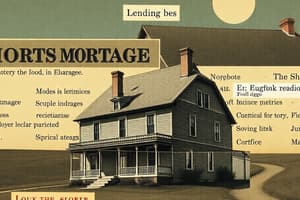Podcast
Questions and Answers
What does Net Interest Margin (NIM) represent for banks?
What does Net Interest Margin (NIM) represent for banks?
- The total amount of loan defaults experienced by the bank.
- The total revenue generated from non-interest income.
- The difference between the interest received on loans and the interest paid on deposits. (correct)
- The cost of operating expenses minus loan repayments.
Which term describes a borrower who is behind on payments but has not yet defaulted?
Which term describes a borrower who is behind on payments but has not yet defaulted?
- Charged-off
- Current
- Delinquent (correct)
- In default
Which factor is NOT considered a determinant of lending profitability?
Which factor is NOT considered a determinant of lending profitability?
- Ensuring interest rate aligns with risk of default
- Default rate of the loan portfolio
- Interest rate charged on loans
- Total number of borrowers in the market (correct)
What usually triggers a bank to treat a borrower as 'in default'?
What usually triggers a bank to treat a borrower as 'in default'?
How can banks minimize losses associated with defaults?
How can banks minimize losses associated with defaults?
Which of the following best describes the term 'current' in lending?
Which of the following best describes the term 'current' in lending?
What is one of the key characteristics of retail lending?
What is one of the key characteristics of retail lending?
What is a critical aspect of credit assessment for loan applicants?
What is a critical aspect of credit assessment for loan applicants?
What is considered a loss event definition in a scorecard model?
What is considered a loss event definition in a scorecard model?
Which type of data is NOT typically included in the scorecard variable selection?
Which type of data is NOT typically included in the scorecard variable selection?
What is the FICO score range typically used in credit scoring?
What is the FICO score range typically used in credit scoring?
Which adjustment is typically made for low credit scores in scorecard usage?
Which adjustment is typically made for low credit scores in scorecard usage?
What is a crucial driver for using credit scorecards?
What is a crucial driver for using credit scorecards?
What is one approach to scorecard development for institutions lacking specific resources?
What is one approach to scorecard development for institutions lacking specific resources?
What is a significant benefit of using automation in scorecard processing?
What is a significant benefit of using automation in scorecard processing?
Outsourcing scorecard development to a credit risk vendor usually involves which process?
Outsourcing scorecard development to a credit risk vendor usually involves which process?
What is primarily evaluated in the judgmental approach to credit assessment?
What is primarily evaluated in the judgmental approach to credit assessment?
What does a scorecard model in retail lending use to determine credit risk?
What does a scorecard model in retail lending use to determine credit risk?
Which of the following is NOT a characteristic of scorecards used in credit assessment?
Which of the following is NOT a characteristic of scorecards used in credit assessment?
Which type of credit evaluation focuses primarily on corporate lending only?
Which type of credit evaluation focuses primarily on corporate lending only?
What role do credit bureaus play in the credit assessment process?
What role do credit bureaus play in the credit assessment process?
What is a major drawback of manual evaluation in credit assessments?
What is a major drawback of manual evaluation in credit assessments?
Which of the following represents a key element in the statistical approach to credit assessment?
Which of the following represents a key element in the statistical approach to credit assessment?
Which factor does NOT typically contribute to the scorecard evaluation process?
Which factor does NOT typically contribute to the scorecard evaluation process?
What does a boxplot visually represent about numerical variables?
What does a boxplot visually represent about numerical variables?
What is the purpose of the Kernel Density Estimation (kde) plot?
What is the purpose of the Kernel Density Estimation (kde) plot?
Which data merging approach can inflate the number of good or bad events?
Which data merging approach can inflate the number of good or bad events?
What type of data is regarded as 'dirty' or 'noisy'?
What type of data is regarded as 'dirty' or 'noisy'?
What does a z-score in statistics indicate?
What does a z-score in statistics indicate?
Which of the following is NOT a type of missing data?
Which of the following is NOT a type of missing data?
When dealing with missing values, why might keeping a variable be beneficial?
When dealing with missing values, why might keeping a variable be beneficial?
What is indicated by a correlation heat map?
What is indicated by a correlation heat map?
Flashcards are hidden until you start studying
Study Notes
Net Interest Margin (NIM)
- Banks make money by charging interest on loans and paying interest on deposits. The difference between these rates is the NIM.
- Credit risk is a key factor in lending profitability. This is because borrowers may default on their loans, reducing the interest revenue generated by lending.
- Loan interest rates should be aligned with default risk and operating costs to ensure net gains and minimize losses.
Lending Terms
- Current: Borrower is up-to-date with loan payments.
- Delinquent: Borrower is behind on loan payments and may incur late fees and penalty interest. This is an early stage of default, typically measured in days (30, 60, 90, 180). Higher delinquency days increase the likelihood of default, triggering collection actions or suspension of the credit account.
- In Default: Borrower fails to repay the debt as agreed. This can be triggered by missing a certain number of payments or being delinquent for a specific period. Banks may treat 180 days of delinquency as being in default. Banks have to write off the debt as a loss.
Characteristics of Retail Lending
- Large number of product loans, with small values.
- Automation is required to be cost-effective due to high operating costs.
- Examples of retail lending products include: home mortgages, auto loans and leasing, personal loans, and credit cards.
Determinants of Lending Profitability
- Interest rate charged on loans: Higher rates generate more revenue.
- Default rate of the loan portfolio: Lower default rates minimize losses.
- To minimize losses due to defaults:
- Assess potential borrowers' likelihood to default.
- Lend to individuals who are better credit risks.
- Limit the amount of credit provided.
- Ensure the interest rate charged matches the average risk of default in the portfolio.
Credit Assessment
- Aim to estimate whether an applicant will successfully repay their loan.
- Based on
- Applicant characteristics
- Credit bureau information
- Application information from other applicants
- Repayment behavior of other applicants
- Types:
- Judgemental: Based on the experience of the lender/loan officer and knowledge of the customer. Uses the "5Cs" of character, capital, collateral, capacity, and condition. Manual and not practical for high-volume lending.
- Statistical: Based on multivariate correlations between inputs and risk of default. Can be automated.
Scorecards
- Credit scorecards are a key approach to retail lending credit assessment.
- Scorecards use historical lending data to develop models that estimate the probability of default based on a customer's profile.
- Scorecard Mechanics:
- Points are assigned to each attribute and summed to get a credit score.
- Points are based on predictive strength and correlation between characteristics.
- Scores are compared to a threshold set by the institution. If the score meets or exceeds the threshold, credit is approved. Otherwise, it is denied.
- Characteristics of Scorecards:
- Decision support tool for assessing credit risk.
- Consistent with how credit analysts would evaluate credit.
- Predictive variables represent major information categories.
- Usually between 8 and 15 variables.
- Score reflects the likelihood of an applicant being a good or bad credit risk.
Credit Bureaus
- Companies that keep records on consumers and businesses, such as their credit use and abuse.
- Data comes from creditors like banks.
- Banks can also get data about customers' loan details from other institutions.
Statistical Machine Learning Predictive Models: Scorecard Model Parameters
- Loss Event Definition: Defines what constitutes a loss event including:
- 30/60/90 delinquent days
- Debt that needs to be charged off or written off due to default
- Borrower bankruptcy
- Claims over $1000
- Fraud over $500
- Negative Net Present Value (NPV)
- Less than x% of debt owed collected.
- Variable Availability and Selection: Determines which variables to use in the model, including demographic, behavioral data, and bureau score information.
- Credit Scores: Are obtained from credit bureaus or third parties that use bureau data to generate scores. Examples include FICO scores, which range from 300 to 850. Also includes raw bureau data like number of credit checks, total amount of credit, and delinquency history.
Scorecard Usage
- Low Scores:
- Higher mortgage down payment
- Higher interest rates
- Requesting further documentation
- Lower beginning credit limit
- High Scores:
- Preferential rates (lower interest rates)
- Higher credit limits
- Premium cards
Drivers for Using Credit Scorecards
- Generate and test multiple scorecards based on different input parameters or customer segments.
- Easy to understand and use.
- Automation, processing efficiency, and repeatability.
- Regulatory concerns: Fairness and transparency - provide reasons for declining credit.
Scorecard Development Strategies
- Buy a generic or pooled data scorecard: Not specific to an institution's customers and products.
- Outsource to a credit risk vendor: Might not fully integrate business logic or be fully understood.
- Develop in-house: Requires data, internal expertise, and software tools.
Data Exploration Lab
- Histogram:
.hist()function, used to visualize the distribution of numerical variables. - Boxplot:
.boxplot()function, visual representation of outliers for numerical variables. Identifies valid and invalid outliers. - Countplot:
.countplot()function, bar charts used to visualize the distribution of categorical variables. - Kernel density estimation (kde):
.kdeplot()function, used to visualize the distribution of events and non-events. - Correlation heatmaps:
.corr()and.heatmap()function, used to understand which variables may overlap and be redundant. - Z-score: Measures how many standard deviations an observation is away from the mean. Outliers have a z-score of more than 3.
Data Merging
- Left joins can create duplicate records, which can inflate the number of bad/good events and skew results.
- One approach to avoid duplicates is to append observations as columns in one row, but this can lead to many empty columns.
- Feature selection and engineering can address this by selectively adding additional columns, such as averages or medians.
### Common Data Problems
- Dirty/Noisy: Negative age, for example.
- Inconsistent Data: Zero may mean actual zero or a missing value.
- Incomplete Data: Missing income data.
- Data Integration and Data Merging Problems: Currency differences.
- Overlapping Data Fields: Salary vs. Income
Missing Data
- Completely at random: The reason for missing data is unrelated to other data.
- At random: The reason for missing data can be inferred from other data.
- Not at random: There is an underlying reason for missing data that is structurally related.
Options for Dealing with Missing Values
- Keep: The variable that is missing could contain important information. Encode missing values.
- Discard: The variable may not be important.
Studying That Suits You
Use AI to generate personalized quizzes and flashcards to suit your learning preferences.




